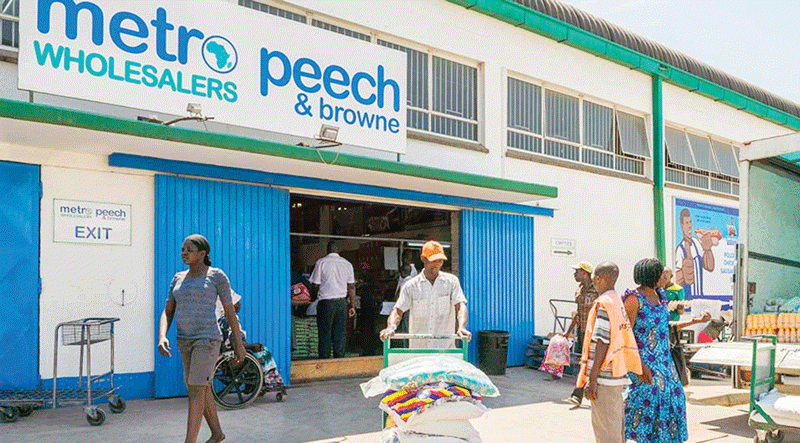
Former British Prime Minister Winston Churchill once said: “For a nation to tax itself into prosperity, is like a man standing in a bucket and trying to lift himself up by the handle”.
This is exactly what the government of Zimbabwe is doing, by announcing a series of draconian tax measures meant to beef up inflows into the fiscus.
This instalment analyses the budget measures that impact business and throws light on some reforms that the government should consider in creating a business landscape for the growth of the formal sector.
Since the 1990s, Zimbabwe has experienced a significant shift toward the informalisation of its economy, which has profoundly affected the government's ability to levy direct taxes and maintain fiscal stability.
Once a vibrant formal sector, contributing robustly to national revenue, now only about 20% of economic activity occurs within this realm. This transformation has far-reaching implications for taxation, governance, and overall economic health.
The rise of the informal economy
The roots of informalisation can be traced back to a series of economic crises that began in the late 1990s, including hyperinflation, political instability, and widespread unemployment.
As formal employment opportunities collapsed, millions of Zimbabweans turned to informal work as a means of survival. This includes street vendors, small-scale farmers, and unregistered businesses that operate outside the regulatory framework.
- Mavhunga puts DeMbare into Chibuku quarterfinals
- Bulls to charge into Zimbabwe gold stocks
- Ndiraya concerned as goals dry up
- Letters: How solar power is transforming African farms
Keep Reading
The informal sector has become a lifeline for many, providing essential goods and services in a context where formal jobs are scarce. However, the growth of the informal economy has significant drawbacks. One of the primary issues is the inability of the government to collect direct taxes from this sector. Informal workers and businesses are not registered with tax authorities, and many operate without formal licences.
As a result, the government faces a shrinking tax base, making it increasingly reliant on indirect taxes, such as Value Added Tax (VAT) and excise taxes, which disproportionately burden the lower-income population.
This shift not only fails to address the economic challenges faced by citizens but also perpetuates a cycle of poverty and underdevelopment.
The ineffectiveness of indirect taxes
Zimbabwe’s economic landscape is marred by a myriad challenges, including high inflation, unemployment, food insecurity, and a failing currency. The government recently announced a series of draconian indirect taxes as a means of generating revenue in a context where direct taxation faces significant limitations. However, this approach is fundamentally flawed and counterproductive.
This imposition of indirect taxes on already struggling citizens will not yield the desired results for Zimbabwe.
Low disposable incomes
The majority of Zimbabweans live below the poverty datum line, with unemployment rates soaring above 90%. In this context, citizens have limited disposable income. Indirect taxes, on rental income and fast food or excise duties on goods and services, disproportionately affect low-income households.
As these taxes are levied on consumption rather than income, they can consume a larger share of the already meager resources of the poor. This leads to a decrease in overall consumption, further harming local businesses and stifling economic growth.
Inflation and price stability
Zimbabwe has a history of hyperinflation, leading to severe price volatility. The introduction of indirect taxes in such an environment exacerbates inflationary pressures. Businesses, faced with increased tax burdens, often pass these costs onto consumers through higher prices.
For citizens already grappling with rising costs of living, additional tax burdens can lead to a vicious cycle of reduced purchasing power and increased poverty.
Impact on aggregate demand
The levying of indirect taxes reduces disposable income and consequently lowers aggregate demand. When consumers are forced to allocate more of their limited resources to pay taxes, they have less to spend on goods and services.
This decline in demand can lead to business closures and job losses, creating a feedback loop that crowds out the remaining formal sector, further constraining the economy. Zimbabwe’s economy, already suffering from low investment and divestment, cannot afford additional shocks that indirect taxes may cause.
Social implications
Increased inequality: Indirect taxes are regressive, disproportionately impacting lower-income individuals who spend a larger portion of their income on basic goods and services. In Zimbabwe, where wealth inequality is stark, the imposition of such taxes exacerbates social disparities. This growing inequality can lead to social unrest, as marginalised communities feel the brunt of policies that favour the wealthy and politically connected.
Erosion of public trust: The Zimbabwean government has a history of mismanagement and corruption, leading to widespread scepticism about its ability to utilise tax revenues effectively. Citizens are likely to view the imposition of new taxes as another means used by the government to extract resources without delivering tangible benefits. This erosion of trust can lead to decreased compliance with tax regulations, as citizens become disillusioned and resistant to a system that they perceive as unjust.
Health and well-being: The burden of indirect taxes can lead families to cut back on essential goods, including food, healthcare, and education. In a country already facing food insecurity and inadequate healthcare services, this can have dire consequences for public health and overall well-being. The state’s focus on revenue generation through indirect taxes fails to account for the basic needs of its citizens, pushing many further into poverty.
Structural challenges
Weak economic infrastructure: Zimbabwe’s economy is characterised by a weak infrastructure and limited capacity for formal economic activity. The informal sector, which employs a significant portion of the population, operates outside the formal tax system. Indirect taxes may not only fail to capture revenue from this sector but can also drive more businesses underground, further eroding the tax base.
Dependence on foreign aid and remittances: Zimbabwe’s economy heavily relies on foreign aid and remittances, which provide a vital lifeline for many households. The imposition of indirect taxes can diminish the capacity of families to utilise these resources effectively, as they may need to redirect funds to cover increased living costs. This reliance complicates the government's revenue generation strategy, as it must navigate the delicate balance between taxation and the economic realities faced by its citizens.
Lack of institutional capacity: The Zanu PF government has historically struggled with governance and institutional capacity. Implementing and enforcing indirect taxes requires effective bureaucratic structures that can monitor compliance and manage tax collection efficiently. Given the existing challenges within Zimbabwe’s public institutions, the introduction of indirect taxes will likely lead to increased corruption and inefficiency, further undermining the intended goals of revenue generation.
Consequences for fiscal policy
The erosion of the formal sector has profound implications for fiscal policy. With a significantly diminished tax base, the government struggles to fund essential public services such as education and healthcare.
Borrowing for infrastructure development is risky business because those foreign loans will need to be paid back. When public investment from own sources declines, it creates a vicious cycle where poor infrastructure and services further deter investment and economic growth. This situation leads to reduced aggregate demand, exacerbating the economic malaise.
Moreover, the informalisation of the economy often leads to lower productivity levels. Many informal enterprises lack access to capital, technology, and training, resulting in lower efficiency compared to their formal counterparts.
The government’s inability to leverage the informal sector effectively stunts economic development and perpetuates a reliance on external aid and remittances.
Capture and governance challenges
Compounding the issues created by informalisation is the rampant corruption within Zimbabwe’s political and economic systems. The practice of "capturing" cabinet ministers, judiciary officials, military leaders, and senior personnel in parastatals, through gifting them with grants for purchasing expensive homes and cars, has created a governance environment characterised by nepotism, graft, and a lack of accountability.
This “jaundiced project” of capture, which started during the late Robert Mugabe’s presidency and continues unabated now, undermines the very institutions that are supposed to promote economic stability and public welfare.
Corruption diverts critical resources away from essential public services. The funds that could have financed infrastructure development, healthcare, and education are instead funnelled into the pockets of captured officials.
This misappropriation of resources erodes public trust in government institutions, further alienating citizens and contributing to social unrest. When citizens perceive their leaders as self-serving and corrupt, they are less likely to comply with tax obligations, further shrinking the tax base.
The judiciary, often seen as a pillar of justice, becomes compromised as well. When officials are bought or influenced by powerful interests, the rule of law is undermined. This creates an environment where contracts are not honoured, property rights are insecure, and businesses are hesitant to operate in the formal sector. The resultant instability deters both foreign and local investment, further exacerbating the challenges facing the economy.
Implications for economic recovery
The dual crises of informalisation and corruption have created a perfect storm that hampers Zimbabwe’s economic recovery. With the formal economy weakened and public trust eroded, the government faces significant challenges in implementing policies that could promote growth and stability. Addressing these issues requires a multi-faceted approach that includes:
Encouraging formalisation: The government should implement incentives for informal businesses to transition to the formal economy. This could include simplified registration processes, tax breaks for small enterprises, availability of low interest loans underwritten by the Reserve Bank of Zimbabwe and access to training and resources.
Strengthening governance: Tackling corruption is essential. This requires establishing transparent systems of governance, enhancing accountability, and creating independent institutions to oversee public spending and resource allocation.
Investing in infrastructure: Public investment in infrastructure can stimulate economic activity, creating jobs and fostering an environment conducive to business growth. This, in turn, can enhance tax revenues and improve public services. But there has to be transparency in the tendering procedures.
Enhancing tax administration: Lifestyle audits showing demanding source of funds, improved tax collection mechanisms and broadening the tax base to include wealthier individuals and corporations can provide the necessary funds to support public services without overburdening the poor. But with the formal sector sitting at around 20%, this will amount to killing the goose that lays the golden egg.
Conclusion
The informalisation of Zimbabwe’s economy, exacerbated by widespread corruption, presents significant barriers to effective taxation and governance. With only 20% of economic activity occurring within the formal sector, the government faces immense challenges in generating revenue through direct taxes. Levying of indirect taxes will not yield desired results.
Simultaneously, the capture of public officials and institutions erodes trust and diverts resources away from essential services, further compromising the state’s ability to foster economic growth.
Addressing these issues requires a comprehensive approach that targets both the informal economy and corrupt practices, ultimately aiming to restore public faith in government and reinvigorate the formal sector.
A citizen summed this all up by saying: “…whilst Zanu PF has successfully disrupted, dismantled, and defeated the opposition, a failed economy now constitutes Zanu PF’s biggest "opposition party" and threat.
“Dwindling government tax revenues, growing impatience by foreign creditors, climate change and the associated food insecurity and hydro power unavailability, low investment (both foreign and local), growing divestment, minimal capital formation, low aggregate demand emanating from constrained affordability are some of the matters that need urgent attention.
“None of these matters respond to slogans or propaganda, nor can they be locked away in Chikurubi Maximum Security Prison,” the citizen said. This is the dilemma facing the Zanu PF-led government of Zimbabwe today.
- Ndoro-Mkombachoto is a former academic and banker. She has consulted widely in strategy, entrepreneurship and private sector development for organisations that include Seed Co Africa, Hwange Colliery, RBZ/CGC, Standard Bank of South Africa, Home Loans, IFC/World Bank, UNDP, USAid, Danida, Cida, Kellogg Foundation, among others, as a writer, property investor, developer and manager. — @HeartfeltwithGloria/ +263 772 236 341










